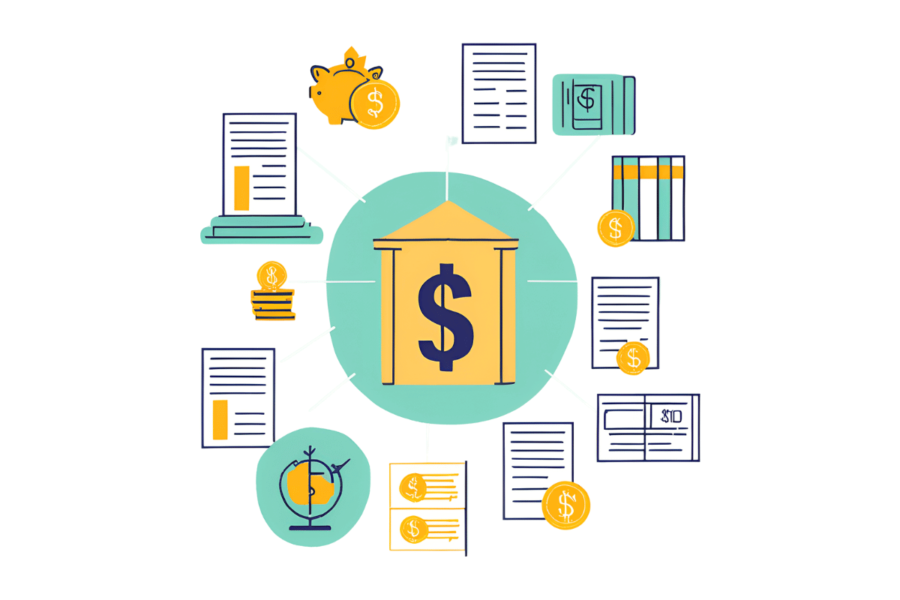When I was at university, I learned the hard way that without following a few essential rules to never be broke, managing money can be tough.
Trust me—I’ve been there.
Between tuition, rent, and trying to cover basic expenses, my bank account always seemed to be on the verge of empty.
But after a while, I started putting these easy, key strategies into practice.
These weren’t drastic changes, but they made a huge difference.
Over time, they allowed me to save up enough money to travel after graduation—a dream I never thought I could afford.
Now, let’s get straight into the 10 strategies that helped me go from barely saving anything to building financial security.
These tips don’t require a financial advisor or a lucky break.
They’re simple, practical, and most importantly—they work.
So whether you’re facing unexpected expenses or just trying to build up your net worth, these strategies will give you a solid foundation.
Let’s dive into these financial rules and get you on the path to never being broke again!
This post may contain affiliate links. This means I may earn a commission if you make a purchase through my links, at no additional cost to you. I only recommend products or services that I personally use and believe will add value to my readers.
10 Proven Rules to Save Money and Never Be Broke Again
Contents
- Plan for Emergencies
- Trick Yourself into Saving and Investing
- Simplify Your Finances
- Make Investing Simple
- Make Yourself Valuable
- Avoid Bad Debt
- Harness the Power of Compound Interest
- Build Multiple Streams of Income
- The Golden Law: Avoid Get-Rich-Quick Schemes
- Stay Consistent and Patient
Articles related to 10 Simple Rules To Never Be Broke Again:
- 8 Simple Tricks to Save $6000 Fast—In Just 5 Months!
- Payday Routine: 8 Steps you Need to do on Payday
- 50 Easy Frugal Living Tips To Save Money
1. Plan for Emergencies
Importance of an Emergency Fund
An emergency fund is a cornerstone of good financial habits. It provides a safety net when unexpected expenses arise, giving you peace of mind and financial security.
Start with a small goal, like $1,000. Gradually build it up to cover 3-6 months of living expenses.
This fund should be kept in a high-interest savings account with high interest rates. And, ideally, you should forget it exists until you truly need it.
How an Emergency Fund Can Save Your Finances
Life is unpredictable. Whether it’s a sudden medical expense or a car repair, having an emergency fund means you won’t have to dip into savings meant for other financial goals or rack up credit card debt.
2. Trick Yourself into Saving and Investing
Self-Discipline Isn’t Always Enough
Maintaining self-discipline can be challenging. But, I can assure you that continuous exposure to financial education through books, podcasts, and videos can help you stay motivated.
This rule is key to never be broke again. (I’m currently reading Think and Grow Rich and would definitely recommend it to anyone thinking of starting a side hustle.)
Set specific financial goals and hold yourself accountable. Consider automating your savings and investments. Set up automatic transfers from your bank account into a savings account or investment fund.
This way, you trick yourself into saving more consistently.
3. Simplify Your Finances
Automate Bills and Savings
One effective way to manage your finances is to automate your bills and savings. Automate payments to avoid late fees and missed opportunities.
A good idea is to pay yourself first by setting up automatic deductions from each paycheck into your savings.
For practical advice on this, I recommend the book Rich Dad Poor Dad. It emphasizes the importance of paying yourself first, each payday.
Transfer money into your savings or investments before spending on luxuries. This will drastically reduce your spending habits in the long term.
Keep Investing Simple
Stick to tried-and-true strategies like index funds, mutual funds and real estate. Simplify your investments and avoid the temptation to pick individual stocks.
Keeping your investments simple can help you stay on track with your financial goals.
4. Make Investing Simple
Invest in What You Understand
Understanding what you invest in is crucial for your financial goals. For comprehensive advice on this, check out Rich Dad’s Guide to Investing. This book can help you grasp the basics and make informed investment decisions.
Focus on index funds and real estate for long-term growth. I had a tough time figuring out what to invest in but found simplicity often leads to better results than complex strategies.
5. Make Yourself Valuable
Acquiring Skills for Increased Earning Potential
Acquiring high-income skills can significantly impact your financial situation. In 2024, skills like content creation, video editing, and copywriting are in high demand.
Investing time in learning these skills can increase your earning potential and ensure long-term financial security to never be broke.
Examples of High-Income Skills
Jobs that change people’s lives or add significant value often bring higher pay. Spend your free time learning valuable skills that can boost your career and financial prospects.
6. Avoid Bad Debt
The Dangers of High-Interest Debt
High-interest debt, such as credit card debt, student loans, and car payments, can be detrimental to your financial health.
While some debt can be beneficial (e.g., real estate investments), consumer debt often keeps people broke.
7. Harness the Power of Compound Interest
Investing Early for Massive Growth
Investing early can lead to substantial financial growth over time. Even small investments can grow exponentially by the time you retire.
Use financial calculators to understand the long-term impact of your decisions. Harnessing the power of compound interest can dramatically enhance your net worth.
8. Build Multiple Streams of Income
Adding Financial Security
Having multiple income sources adds financial security.
I currently work a 9-5 job and manage a blog after work and on weekends.
While it’s challenging to fit around my lifestyle, making daily to-do lists and journaling to plan and track progress has been a great help in staying organized.
Benefits of Extra Income
Sacrificing a year or two to work extra jobs or side hustles can pay off long-term. Use additional income to invest and build future wealth.

9. The Golden Law: Avoid Get-Rich-Quick Schemes
Why Chasing Quick Money Schemes Rarely Works
Get-rich-quick schemes are rarely successful. As noted in The Richest Man in Babylon, avoid impossible earnings promises and scam investments. Patience and consistency often yield better results.
10. Stay Consistent and Patient
The Journey to Financial Security
Achieving financial security takes time and effort. Consistency in saving, investing, and building skills will lead to success.
Stay patient and keep working towards your financial goals. The journey may be long, but the rewards are worth it.
Conclusion
As you start your journey to financial security, remember that the rules to never be broke are key to achieving financial freedom.
Following these 10 rules can guide you through the ups and downs of financial planning, helping you manage essential expenses and prepare for unexpected costs.
Building an emergency fund provides a safety net for life’s surprises. Use strategies to trick yourself into saving and investing, stay motivated, and simplify your finances to keep your bank account in check and grow your net worth.
Invest in what you understand and focus on high-income skills like content creation and video editing to boost your earnings. Avoid bad debt, leverage compound interest, and create multiple income streams to add financial security.
While the path to real wealth may take time, staying consistent and patient with your financial habits will pay off. These strategies will help you get a better understanding of your financial situation and build a strong foundation for the future.
For more tips on managing your money and achieving financial freedom, join my mailing list. The sign-up link is just below.
Stay informed, stay motivated, and take charge of your financial future today!
The information provided in this guide is for educational purposes only. Any actions taken based on this information are at the reader’s own risk. It is advisable to consult with relevant professionals or advisors for personalised advice.



